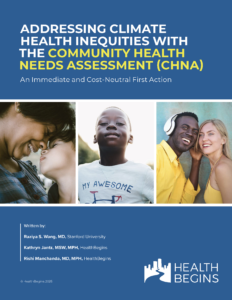Climate change has a profound and growing impact on human health, through effects on extreme weather events, food and water supplies, and disease transmission. Direct consequences include injury, illness, and death, while indirect consequences may include forced migration, loss of livelihoods, and decreased access to health care.
Climate change does not affect all populations equally. Social structures cause some populations to suffer higher exposures and lower resilience, magnifying health inequities within and across communities. Health care has a responsibility to act to prevent these deaths—both to mitigate its own contribution to climate change and support community climate adaptation.
This HealthBegins Policy and Practice Brief proposes a simple, cost-neutral intervention: incorporating climate change planning into an existing and required process for tax-exempt hospitals, the Community Health Needs Assessment (CHNA). This approach invites every healthcare organization to immediately begin addressing the impact of climate change on health at the community level and with community participation. This Brief offers a framework for implementing the CHNA with a climate health equity lens.
Resources
- Health Care Climate Council: Action Playbook for Hospitals
- National Academy of Medicine: Key Actions to Reduce Greenhouse Gas Emissions by U.S. Hospitals and Health Systems
- Practice Greenhealth
- My Green Doctor
- The Joint Commission: Sustainable Healthcare Resource Center
- ScienceDirect: The Journal of Climate Change and Health
- EyeSustain
- World Health Organization: WHO guidance for climate resilient and environmentally sustainable health care facilities

